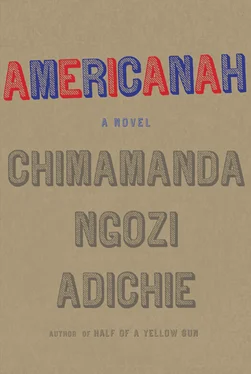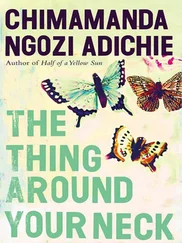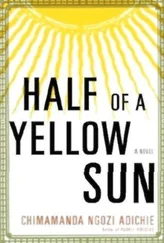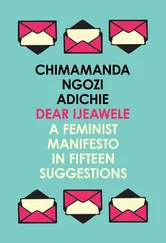Aisha pulled out her phone from her pocket and then slipped it back with a frustrated sigh.
“I don’t know why Chijioke not call to come,” she said. Ifemelu said nothing. She and Aisha were alone in the salon; Halima had just left. Ifemelu was tired and her back throbbed and the salon had begun to nauseate her, with its stuffy air and rotting ceiling. Why couldn’t these African women keep their salon clean and ventilated? Her hair was almost finished, only a small section, like a rabbit’s tail, was left at the front of her head. She was eager to leave.
“How you get your papers?” Aisha asked.
“What?”
“How you get your papers?”
Ifemelu was startled into silence. A sacrilege, that question; immigrants did not ask other immigrants how they got their papers, did not burrow into those layered, private places; it was sufficient simply to admire that the papers had been got, a legal status acquired.
“Me, I try an American when I come, to marry. But he bring many problems, no job, and every day he say give me money, money, money,” Aisha said, shaking her head. “How you get your own?”
Suddenly, Ifemelu’s irritation dissolved, and in its place, a gossamered sense of kinship grew, because Aisha would not have asked if she were not an African, and in this new bond, she saw yet another augury of her return home.
“I got mine from work,” she said. “The company I worked for sponsored my green card.”
“Oh,” Aisha said, as though she had just realized that Ifemelu belonged to a group of people whose green cards simply fell from the sky. People like her could not, of course, get theirs from an employer.
“Chijioke get his papers with lottery,” Aisha said. She slowly, almost lovingly, combed the section of hair she was about to twist.
“What happened to your hand?” Ifemelu asked.
Aisha shrugged. “I don’t know. It just come and after it go.”
“My aunt is a doctor. I’ll take a picture of your arm and ask her what she thinks,” Ifemelu said.
“Thank you.”
Aisha finished a twist in silence.
“My father die, I don’t go,” she said.
“What?”
“Last year. My father die and I don’t go. Because of papers. But maybe, if Chijioke marry me, when my mother die, I can go. She is sick now. But I send her money.”
For a moment, Ifemelu did not know what to say. Aisha’s wan tone, her expressionless face, magnified her tragedy.
“Sorry, Aisha,” she said.
“I don’t know why Chijioke not come. So you talk to him.”
“Don’t worry, Aisha. It will be okay.”
Then, just as suddenly as she had spoken, Aisha began to cry. Her eyes melted, her mouth caved, and a terrifying thing happened to her face: it collapsed into despair. She kept twisting Ifemelu’s hair, her hand movements unchanged, while her face, as though it did not belong to her body, continued to crumple, tears running from her eyes, her chest heaving.
“Where does Chijioke work?” Ifemelu asked. “I will go there and talk to him.”
Aisha stared at her, the tears still sliding down her cheeks.
“I will go and talk to Chijioke tomorrow,” Ifemelu repeated. “Just tell me where he works and what time he goes on break.”
What was she doing? She should get up and leave, and not be dragged further into Aisha’s morass, but she could not get up and leave. She was about to go back home to Nigeria, and she would see her parents, and she could come back to America if she wished, and here was Aisha, hoping but not really believing that she would ever see her mother again. She would talk to this Chijioke. It was the least she could do.
She brushed the hair from her clothes and gave Aisha a thin roll of dollars. Aisha spread it out on her palm, counting briskly, and Ifemelu wondered how much would go to Mariama and how much to Aisha. She waited for Aisha to put the money into her pocket before she gave her the tip. Aisha took the single twenty-dollar bill, her eyes now dried of tears, her face back to its expressionlessness. “Thank you.”
The room was dense with awkwardness, and Ifemelu, as though to dilute it, once again examined her hair in the mirror, patting it lightly as she turned this way and that.
“I will go and see Chijioke tomorrow and I’ll call you,” Ifemelu said. She brushed at her clothes for any stray bits of hair and looked around to make sure she had taken everything.
“Thank you.” Aisha moved towards Ifemelu, as though to embrace her, then stopped, hesitant. Ifemelu gripped her shoulder gently before turning to the door.
On the train, she wondered just how she would persuade a man who didn’t seem keen to marry to do so. Her head was aching and the hair at her temples, even though Aisha had not twisted too tightly, still caused a tugging discomfort, a disturbance of her neck and nerves. She longed to get home and have a long, cold shower, put her hair up in a satin bonnet, and lie down on her couch with her laptop. The train had just stopped at Princeton station when her phone rang. She stopped on the platform to fumble in her bag for it and, at first, because Aunty Uju was incoherent, talking and sobbing at the same time, Ifemelu thought she said that Dike was dead. But what Aunty Uju was saying was o nwuchagokwa, Dike anwuchagokwa . Dike had nearly died.
“He took an overdose of pills and went down to the basement and lay down on the couch there!” Aunty Uju said, her voice cracked with her own disbelief. “I never go to the basement when I come back. I only do my yoga in the morning. It was God that told me to go down today to defrost the meat in the freezer. It was God! I saw him lying there looking so sweaty, sweat all over his body, and immediately I panicked. I said these people have given my son drugs.”
Ifemelu was shaking. A train whooshed past and she pressed her finger into her other ear to hear Aunty Uju’s voice better. Aunty Uju was saying “signs of liver toxicity” and Ifemelu felt choked by those words, liver toxicity , by her confusion, by the sudden darkening of the air.
“Ifem?” Aunty Uju asked. “Are you there?”
“Yes.” The word had traveled up a long tunnel. “What happened? What exactly happened, Aunty? What are you saying?”
“He swallowed a whole bottle of Tylenol. He is in the ICU now and he will be fine. God was not ready for him to die, that is all,” Aunty Uju said. The sound of her nose-blowing was loud over the phone. “Do you know he also took anti-nausea so that the medicine would stay in his stomach? God was not ready for him to die.”
“I am coming tomorrow,” Ifemelu said. She stood on the platform for a long time, and wondered what she had been doing while Dike was swallowing a bottle of pills.
Obinze checked his BlackBerry often, too often, even when he got up at night to go to the toilet, and although he mocked himself, he could not stop checking. Four days, four whole days, passed before she replied. This dampened him. She was never coy, and she would have ordinarily replied much sooner. She might be busy, he told himself, although he knew very well how convenient and unconvincing a reason “busy” was. Or she might have changed and become the kind of woman who waited four whole days so that she would not seem too eager, a thought that dampened him even more. Her e-mail was warm, but too short, telling him she was excited and nervous about leaving her life and moving back home, but there were no specifics. When was she moving back exactly? And what was it that was so difficult to leave behind? He Googled the black American again, hoping perhaps to find a blog post about a breakup, but the blog only had links to academic papers. One of them was on early hip-hop music as political activism — how American, to study hip-hop as a viable subject — and he read it hoping it would be silly, but it was interesting enough for him to read all the way to the end and this soured his stomach. The black American had become, absurdly, a rival. He tried Facebook. Kosi was active on Facebook, she put up photos and kept in touch with people, but he had deleted his account a while ago. He had at first been excited by Facebook, ghosts of old friends suddenly morphing to life with wives and husbands and children, and photos trailed by comments. But he began to be appalled by the air of unreality, the careful manipulation of images to create a parallel life, pictures that people had taken with Facebook in mind, placing in the background the things of which they were proud. Now, he reactivated his account to search for Ifemelu, but she did not have a Facebook profile. Perhaps she was as unenchanted with Facebook as he was. This pleased him vaguely, another example of how similar they were. Her black American was on Facebook, but his profile was visible only to his friends, and for a crazed moment, Obinze considered sending him a friend request, just to see if he had posted pictures of Ifemelu. He wanted to wait a few days before replying to her but he found himself that night in his study writing her a long e-mail about the death of his mother. I never thought that she would die until she died. Does this make sense? He had discovered that grief did not dim with time; it was instead a volatile state of being. Sometimes the pain was as abrupt as it was on the day her house help called him sobbing to say she was lying unbreathing on her bed; other times, he forgot that she had died and would make cursory plans about flying to the east to see her. She had looked askance at his new wealth, as though she did not understand a world in which a person could make so much so easily. After he bought her a new car as a surprise, she told him her old car was perfectly fine, the Peugeot 505 she had been driving since he was in secondary school. He had the car delivered to her house, a small Honda that she would not think too ostentatious, but each time he visited, he saw it parked in the garage, coated in a translucent haze of dust. He remembered very clearly his last conversation with her over the phone, three days before she died, her growing despondence with her job and with life on the campus.
Читать дальше












